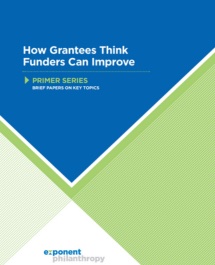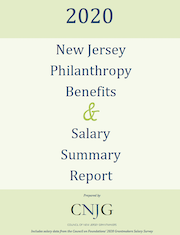Site Search
- resource provided by the Forum Network Knowledgebase.
Search Tip: Search with " " to find exact matches.
A CNJG member queried our listserves with the question "Does anyone have templates that can be used and/or shared related to grant approval letters and terms and conditions related to COVID-19 grants?" CNJG compiled the answers from responding members.


The 2020 New Jersey Philanthropy Benefits & Salary Report provides a valuable benchmarking resource. Developed and compiled for CNJG members exclusively, the report presents comprehensive benefits data specific to New Jersey's grantmaking community, alongside data from the Council on Foundations' annual salary survey. Produced every three years, this benchmarking report is a highly valued benefit of your membership in the Council of New Jersey Grantmakers. Thank you to the CNJG members that completed the benefits survey earlier this year that enabled us to produce this report.
The first section, 2020 Benefits Summary Report, includes benefits data for the 2020 calendar year and covers employment, leave benefits, insurance benefits, and more. We are delighted to also present for the first time in this triennial report, demographic data on the boards and staffs of those that responded. The second section, 2020 Grantmaker Salary Tables: New Jersey, Mid-Atlantic and National Data provides data on compensation across a wide range of positions and grantmaking entities. Thank you to the CNJG members that completed the Council on Foundations’ annual survey on salaries that enabled us to produce this section of the report.
Under-resourced communities are going without because nonprofits can't meet demand. Americans —particularly those in low-income communities—are still struggling to secure jobs, affordable housing, and healthcare. Nonprofit Finance Fund’s 2015 State of the Nonprofit Sector Survey focuses on the underlying causes of these dynamics by exploring the programmatic, financial, and operational issues facing nonprofits across the U.S.
NFF launched the Survey in 2008, when economic crisis threatened the viability of many organizations. Seven years later, results from 5,451 respondents show some indications of recovery, stabilization, and growth. Nonprofits are adding jobs, engaging in strategic conversations such as leadership succession planning, and looking to retain their workforce. Yet as they raise their sights from the focus on short-term crisis, many are confronting the troubling reality that current practices cannot sustain organizations in the long-term or meet the needs of the communities they serve now. Many organizations have stumbled out of crisis looking to make the necessary investments to secure their long-term future. And it is a hard road ahead.
